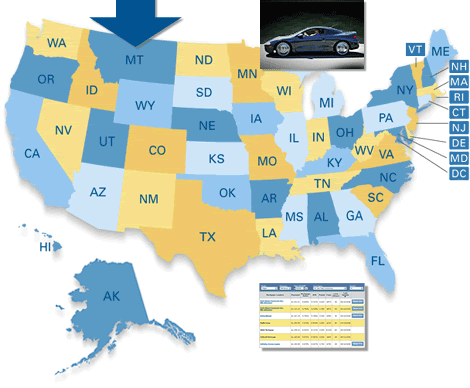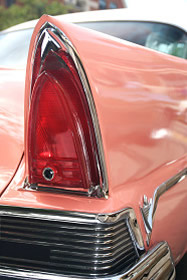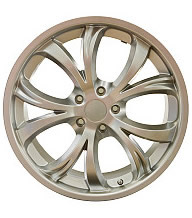Automobile Financing
Buying a Used Car: Two Options
by Amy Lillard
Is a used car on your horizon?
If you've decided that a used car is your ideal purchase, you have multiple options for shopping, financing and protecting your purchase. In this article we detail dealer and private sales of used cars, and advise you on what to expect.

Dealership
Buying a used car from a dealer is in many ways similar to buying a new car. You have the option of paying in full or financing over time. You have comprehensive vehicle information. And – you have lots of pitfalls to avoid.
First, be well versed on the loan options and payment schedules available to you. Pay close attention to the loan details – the exact price, the amount you're repaying, the finance charge, the APR, and the down payment required.
New and Used Auto Loan Rates
Choose Your State Below

Start by selecting your state
Dealers are required by the Federal Trade Commission to post a Buyers Guide in every used car for sale. The Buyers Guide will tell you:
• Whether the vehicle is being sold “as is” or with a warranty
• What percentage of the repair costs a dealer will pay under the warranty
• The major mechanical and electrical systems on the car, including any major problems to watch out for
• To get all promises in writing
• To keep the guide for reference after the sale
• To ask an independent mechanic to inspect the car before purchase
The Buyers Guide acts as law for the sales contract, and overrides any contrary provisions. If the Guide says the car comes with a warranty but the contract says the car is sold “as is,” the dealer must provide the warranty described in the Guide.
Several types of warranties can govern your used car:
• As-is. For all intents and purposes, this car has no warranty.
• Implied Warranty. State laws hold dealers responsible if cars don't meet reasonable quality standards. Usually this applies to the basic functions of a car. A “warranty of merchantability” promises that the car will do what it's supposed to – run. Watch in the contract or other written notices if dealers eliminate this implied warranty with “as is” or “with all faults” notations.
• Unexpired Manufacturer's Warranties. With these, your car is still covered under the original manufacturer warranty. Ensure you have all the information on what's covered, expiration date and miles, and necessary paperwork.
• Service Contracts. Providing repair and maintenance for a set time, service contracts are like warranties, but are not included in the price of the car. Consider these carefully, including the service offered and price.
New and Used Auto Loan Rates
Choose Your State Below

Start by selecting your state
New and Used Auto Loan Rates
Choose Your State Below

Start by selecting your state
Private Owners
Buying a used car from a private owner may be cheaper. But private sellers are not covered by the Federal Trade Commission's rules and don't have to use Buyers Guides. In addition, private sales are usually not covered by the implied warranties given for dealership cars, meaning most used cars will be “as is.”
Prior to making a purchase from a private seller, do your research. Find as much information online about the car's major systems, and use that information as a shopping tool. In addition, don't hesitate to have a privately sold car inspected by your mechanic.
No matter if you buy a car from a private seller or dealer, protect yourself by examining the car thoroughly, test driving it under varied road conditions, inspecting the car professionally, and checking the maintenance record. Following these steps can ensure your used car will be a reliable addition to your life, and not a regrettable lemon.
For more information, visit the Federal Trade Commission's Facts for Used Car Purchases: http://www.ftc.gov/bcp/conline/pubs/autos/usedcar.htm.
 A frequent contributor to ERATE® since 2006, Amy Lillard is a freelance writer specializing in turning complex information into useful tips and tricks for readers. For questions or topic suggestions, contact Amy at [email protected].
A frequent contributor to ERATE® since 2006, Amy Lillard is a freelance writer specializing in turning complex information into useful tips and tricks for readers. For questions or topic suggestions, contact Amy at [email protected].
Other related articles:
Shopping Prep: What You'll Need to Obtain Car Insurance Quotes
Auto Insurance Quotes and Policies: Commonly Used Terms
Understanding Your Auto Insurance Quotes: The 7 Types of Car Insurance
Car Insurance Quotes Demystified: What Factors Determine Rates
Car Insurance Quotes: Discovering the Best Deals
Auto Loans Advice: New Cars & Used Cars

Automotive Loans: Trading in a Car
Automotive Loans: What Laws Protect Car Buyers?
Automotive Loans: Trade In or Sell a Car?
Automotive Loans: Is Zero Percent Financing Really Possible?
Automotive Loans: Determining a Down Payment
Automotive Loans: The Truth About "Add-Ons"
Automotive Loans: Top 5 Mistakes When Buying a Car
Automotive Loans: Shopping Online
Automotive Loans: Dealer Incentives to Buy
Automotive Loans: Car Buying Incentives
Automotive Loans: Should You Buy New or Used?
Automotive Loans: What to Know About Interest Rates
Automotive Loans: Negotiating a Loan with a Dealer
Automotive Loans: How Much Car Can You Afford?
Automotive Loans: Understanding Typical Loan Language
Automotive Loans: Types of Financing
Automotive Loans: Buying Vs Leasing
Automotive Loans: Applying for a Car Loan

Buying a Car: Standard and Extended Warranties
Car Buying: Financing Background and Steps
Leasing a Car: Two Types of Leases - Closed & Open
Buying a Used Car: Two Options
Buying a Car: 5 Steps to Find the Perfect Deal
Automobile Buying/Financing

5 Steps to Find the Perfect Car
Auto loan defaults to rise 7 percent in 2010
Auto Show Season Tips for Buyers
When is the Best Time to Buy a New Car?
Making a Vehicle Purchase? Enjoy These Helpful Tips
Chances are, your next car will be used. Drive a hard bargain
What your car is really saying
2012 President's Day auto sales among best ever
Special Report: Hitting the Brakes on Auto Dealer Loans
Auto Insurance
Buying Ins - Shopping for Insurance
Best Car Insurance Plan for You


